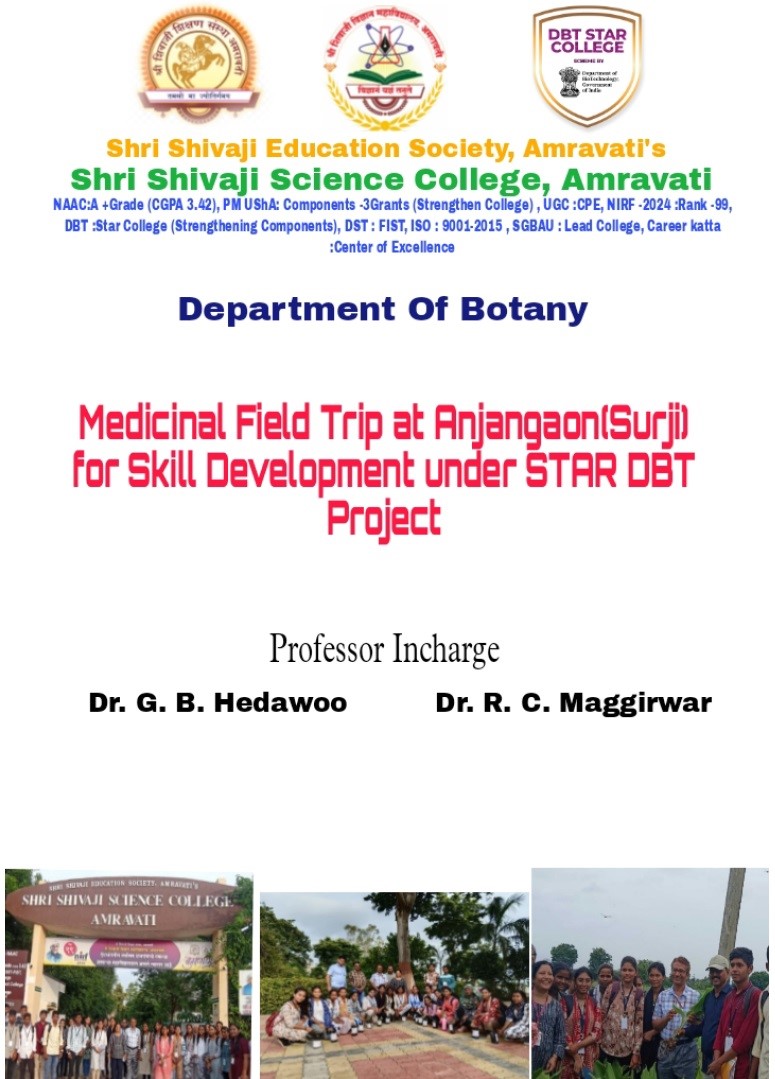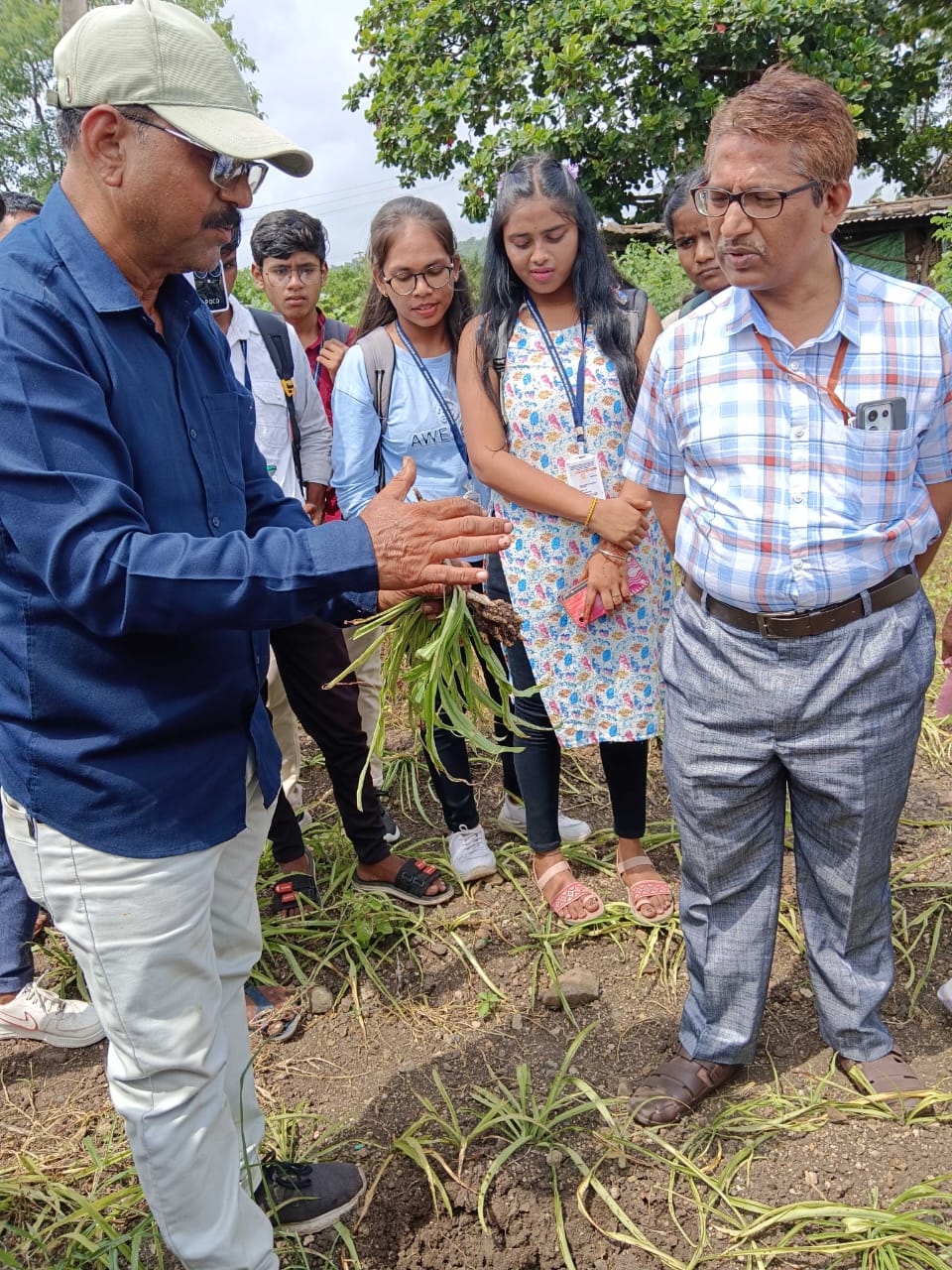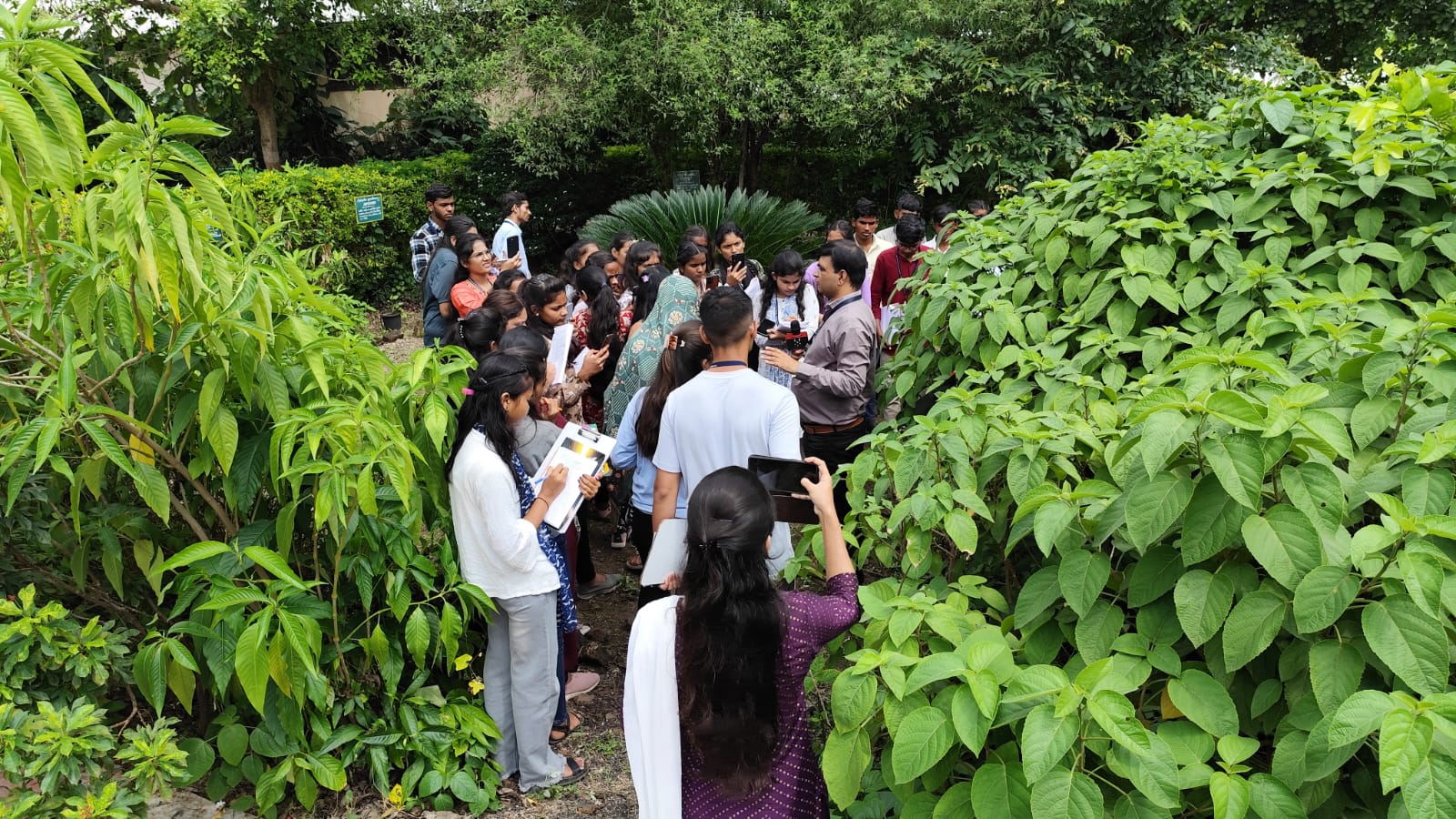SHRI SHIVAJI SCIENCE COLLEGE, AMRAVATI
DBT STAR COLLEGE PROJECT ACTIVITY
ACTIVITY REPORT

Medicinal Field Trip at Anjangaon (Surji) for Skill Development under STAR DBT Project
Activity Dates: 12/09/2024
Type of Activity: Field Studies
Organizing Department: Department of Botany & Bioinformatics
Program Coordinators: Dr. G. B. Hedawoo and Dr. R. C. Maggirwar
Head of the Department: Dr. D. D. Khedkar
External Collaborator (if any): Dr. Mangesh Dagwal, Associate Professor Department of Botany, Radhadevi Sarda College, Anjangaon (Surji) and Mr. Ravi Anokar, local medicinal plant grower
Objectives:
- To enhance students' skills related to sustainable agricultural practices and modern techniques used for the cultivation, harvesting, and processing of medicinal plants.
- To provide students with firsthand knowledge of the cultivation practices, care, and management of various medicinal plants
- To allow students to interact directly with farmers experienced in growing medicinal plants
- To explore the economic benefits of medicinal plant cultivation, including the role of medicinal plants in local and global markets
- To learn about the supply chain management of medicinal plants, from cultivation and harvesting to transportation, marketing, and the sale of plant materials in the medicinal plant industry.
No of Beneficieries: 33
Classes Involved: B. Sc. I Botany (Major and Minor)
Venue of the Activity: 1. Medicinal Plant's Garden at Radhabai Sarda College 2. Medicinal plant's field at Chinchona
Activity Report:
As part of the curriculum for first-year Botany students and under the auspices of the STAR DBT Project for Skill Development, a medicinal field trip to Anjangaon (Surji) was organized. This initiative provided students with a practical, hands-on experience in understanding the cultivation and economic potential of medicinal plants. The primary objective of this field trip was to familiarize students with the sustainable practices involved in medicinal plant agriculture, the challenges faced by farmers, and the overall scope of medicinal plant cultivation in rural settings. Moreover, it was aimed at opening new vistas for skill development, enhancing agricultural practices, and understanding the supply chain involved in medicinal plant cropping and marketing.
The field visit also created opportunities for students to engage directly with the farming community, offering valuable insights into real-world agricultural practices. The interaction fostered mutual learning between academic knowledge and practical farming expertise, helping students to broaden their perspective on medicinal plant research and cultivation.
The study tour took place on a bright morning, with around 33 first-year Botany students gathering at Shri Shivaji Science College for a journey to Anjangaon (Surji), a location known for its diverse range of medicinal plant farming. The tour was part of the ongoing activities under the STAR DBT Project, aimed at fostering practical skill development in students by exposing them to real-world agricultural scenarios.
Upon arrival at Anjangaon (Surji), the group was welcomed by Dr.Mangesh Dagwal and his team along with agricultural expert Mr. Ravi Anokar specializing in medicinal plant cultivation. The day's activities were meticulously planned to cover a range of topics, from sustainable farming techniques to the intricacies of market supply chains.
The day commenced with a comprehensive introduction to in all 40 various medicinal plants grown in the medicinal plant’s garden of their college, including Andrographis paniculata, Hemidesmus indicus,Leonotis nepetifolia, Cissus quadrangularis, Chamaecostus cuspidatus etc. Students were able to observe these plants in different stages of growth, from seedlings to mature plants ready for harvest. Detailed information was provided on the specific medicinal uses of these plants, their biological characteristics, and the best practices for their cultivation.
Students took keen interest in understanding the ecological requirements of these plants, including soil quality, water usage, and climate adaptability. This helped students grasp the importance of choosing the right plant species based on regional conditions, further enhancing their understanding of sustainable agricultural practices.
The core focus of the tour was on learning the cultivation techniques employed by the farmers. The students were taken to farms of Mr. Ravi Anokar, where they observed and learned activities like planting, irrigation, organic composting, and pest control measures of Curcuma sp. and Chlorophytum borivilianum.
The use of organic farming techniques was emphasized throughout the tour. Farmers demonstrated how they avoid chemical fertilizers and pesticides, relying instead on organic compost and natural pest repellents. This provided valuable insight into eco-friendly farming practices that can ensure sustainable crop yield while maintaining soil health.
Additionally, students were introduced to integrated farming systems, where medicinal plants are grown alongside other crops, maximizing land use and providing multiple income streams for farmers. Such techniques promote biodiversity and reduce the risks associated with monoculture.
A key highlight of the tour was the interactive session between students and the expert teacher along with local farmer. The students asked questions about the challenges faced in medicinal plant cultivation, including issues related to climate change, pest infestations, and water scarcity.
Farmers explained how traditional knowledge combined with modern agricultural techniques had enabled them to overcome these challenges. They discussed their reliance on natural irrigation methods, such as rainwater harvesting, and their adoption of drought-resistant plant varieties. The interaction provided students with a real-world perspective on the complexities of agricultural management in rural India.
The farmers also discussed the importance of crop rotation and how it helps maintain soil fertility and prevent pest infestations. This session was particularly enlightening as it revealed the significant role that practical experience plays in successful medicinal plant farming, which complemented the theoretical knowledge students had acquired in their classrooms.
The next segment of the tour focused on the economic potential of medicinal plants. Local agricultural experts highlighted how medicinal plants offer lucrative opportunities for small-scale farmers, given the increasing global demand for herbal products.
Students learned about the market dynamics of medicinal plants, including the supply and demand cycle, pricing strategies, and the importance of maintaining consistent quality for market success. They were introduced to post-harvest processing techniques such as drying, packaging, and quality testing, which are crucial for ensuring that medicinal plant products meet market standards.
In addition, students were provided with insight into value-added products derived from medicinal plants, such as essential oils, herbal teas, and medicinal powders. The discussion opened new avenues for potential entrepreneurial ventures and skill development in the field of herbal product manufacturing and marketing.
One of the significant learnings from the trip was related to the supply chain management of medicinal plants. Students were informed about the various stages involved, from harvesting to transporting the plant material to processing units and finally to market distribution.
Experts explained the importance of efficient supply chain management in maintaining product quality and reducing losses during transit. The session also highlighted the challenges faced in ensuring a stable supply of plant material, especially during off-season periods, and how farmers manage these challenges through proper planning and crop diversification
The final discussion revolved around the future prospects of medicinal plant agriculture and how it ties into the broader framework of skill development. Students were encouraged to view medicinal plant farming not just as a traditional practice but as a sector with immense potential for research, innovation, and entrepreneurship.
With growing consumer interest in natural remedies and herbal products, the medicinal plant industry is expected to see substantial growth in the coming years. Students were inspired to consider future careers in fields such as plant research, agricultural entrepreneurship, and sustainable farming technologies. The tour not only provided them with valuable knowledge but also sparked their imagination about potential research projects and career paths.
Conclusion
The study tour to Anjangaon (Surji) under the STAR DBT Project for Skill Development was an enriching experience for the first-year Botany students. It offered them a unique opportunity to bridge the gap between theoretical learning and practical application. By interacting with Expert teacher, farmer and observing real-world agricultural practices, students gained valuable insights into the cultivation of medicinal plants, the economic viability of medicinal plant farming, and the importance of sustainable farming practices.
The tour succeeded in opening new avenues for skill development, highlighting future career prospects in the medicinal plant industry, and promoting awareness about the potential of herbal products in modern markets. Ultimately, the tour served as a vital step in empowering students with the knowledge and skills needed to contribute meaningfully to the field of medicinal plant agriculture and the wider domain of sustainable development.
Outcomes:
- Students gained a deep understanding of sustainable cultivation practices for medicinal plants
- Students gained Real-World Exposure to Farmer Challenges and Solutions
- Students explored the market potential of medicinal plants, learning about supply and demand cycles
- The hands-on experience in cultivation, composting, irrigation, and pest management enhanced the students' practical skills in agriculture.
- Students gained an understanding of the entire supply chain, from cultivation and harvesting to market distribution.
Photos:
 Students received medicinal plant saplings |  Mr. Ravi Anokar giving information to students in the field |
 Students writing information about medicinal plants |
Attendance Sheet:
 Sheet |
 Sheet |